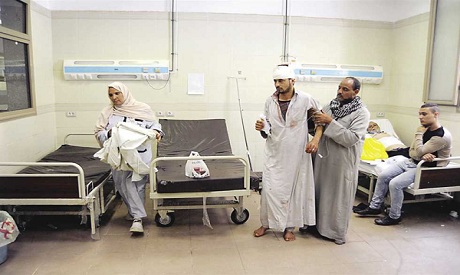Last month parliament passed a long awaited new health insurance law. The 67-article law seeks to make quality health care accessible to all by improving the services offered by public hospitals
The law’s provisions will be rolled out in three phases, ending in 2032. The first phase, beginning this year, will cover the governorates of Port Said, Suez, Ismailia, North Sinai, South Sinai and Alexandria. The second phase includes Fayoum, Beni Sweif, Assiut, Minya, Sohag, Qena, Luxor, Aswan, the New Valley and the Red Sea. The final phase will include the heavily populated governorates of Cairo, Giza, Qalioubeya, Beheira, Gharbeya, Menoufeya, Kafr Al-Sheikh, Sharqeya, Daqahleya as well as Damietta and Marsa Matrouh.
Employees currently covered by Social Insurance Law 79/1975 will pay between one and four per cent of their salaries with additional fees — 2.5 per cent for a non-working wife, one per cent for the first two children and 1.5 per cent for any additional children — levied for dependents.
Widows and pensioners will pay two per cent of their monthly pension.
Oncologist Dina Abdel-Azim says the new system will provide immediate medical care for patients at the point of delivery.
“The new system is essentially a social solidarity scheme. The family is the main unit of medical coverage rather than the individual as was the case in previous systems. The quality of services provided to patients is very high, and includes unofficial workers such as street vendors and housemaids.”
The government will fully cover the subscriptions of those who cannot afford insurance payments.
Ahmed Emadeddin Radi, minister of health and population, says the Ministry of Social Solidarity, will cover the health insurance payments of anyone eligible for unemployment allowances. The same ministry is also committed to collect the contributions of health insurance due from different parties.
Deputy Minister of Health and Population for Insurance Affairs Ali Hegazi says the new system will cost the government a minimum of LE120 billion a year compared with LE8 billion for the current health system.
The new system will be funded through new taxes, including on cigarettes, and increased fees for birth, death, marriage and divorce certificates, income generated by a LE20 toll on vehicles travelling between governorates and payments levied on car owners renewing their licences. The latter will be charged at LE50 for cars with engine capacity of less than 1,600 CC, LE150 for cars with a capacity of less than 2,000 CC and LE300 for cars with a capacity exceeding 2,000 CC.
LE1,000 will be levied on each bed when issuing licences of new hospitals and medical centres.
Three new bodies will be established to oversee the system, says Radi. The Comprehensive Health Insurance Authority will be responsible for the management and financing of the insurance system while the Healthcare Organisation will regulate the provision of health and therapeutic services at all levels. The Public Authority for Accreditation and Health Control (PAAHC), which will be allocated an independent budget and be under the direct supervision of the prime minister, will monitor the quality of all health services offered in Egypt.
“The new programme will end the high cost of medical services provided by the private sector,” announced Hegazi.
Private hospitals will have to adhere to prices set by the government, says Health Ministry Spokesman Khaled Megahed, or else become liable for stiff penalties as stipulated in the new law.
Patients will be required to submit their national ID’s to receive medical care, though Megahed says the PAAHC may provide services to foreign residents.
Pharmacist Tarek Mustafa believes the new law will allow all citizens to access quality medical care.
“The new law allows the patient to choose between private and public facilities,” he says, adding that the regulatory system will guarantee the quality of services offered to patients.
Some members of Doctors’ Syndicate, however, have voiced concerns about the new system. Doctors’ Syndicate member Ihab Taher argues that under the new law private hospitals are better placed to meet the standards demanded by the monitoring authority. “We need to know — for it is not clearly mentioned in the law — what will happen to hospitals that do not meet the regulator’s benchmarks,” he said.
Doctors’ Syndicate board member Hani Mehanna complains that the new legislation contains no clear guidelines for improving the salaries of doctors and other medical staff.
*This article was first published in Al-Ahram Weekly

